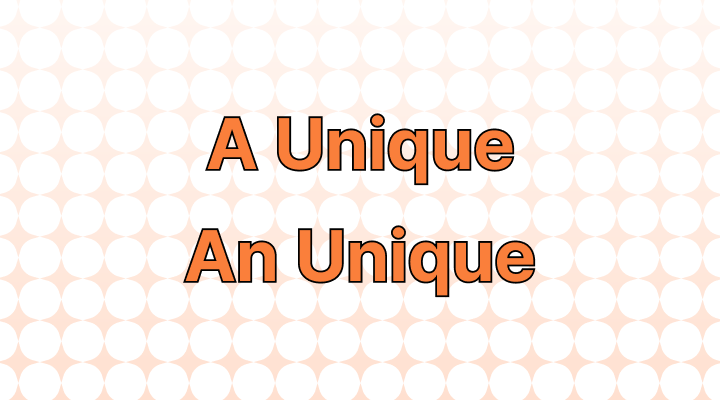The correct phrasing is "a unique." The word "unique" is pronounced with a beginning consonant sound ("yoo-neeck"), and as a rule of English grammar, "a" is used before words that start with consonant sounds, while "an" is used before words that begin with vowel sounds.
So, you would say, "It is a unique opportunity," not "an unique opportunity."
Example sentences
- This restaurant offers a unique blend of flavors, unlike anything you've ever tasted.
- The antique store is filled with a unique collection of vintage items from various eras.
- Her fashion sense is a unique combination of classic elegance and modern trends.
- The art exhibition showcased a unique fusion of traditional and contemporary artworks.
- The small coastal town has a unique charm that draws visitors from around the world.
- The company's approach to problem-solving is a unique and innovative one.
- Their friendship is a unique bond forged through years of shared experiences.
- The music festival promises a unique lineup of talented artists and performers.
- This book offers a unique perspective on the history of the ancient civilization.
- The boutique hotel provides a unique and personalized experience for each guest.
Common idioms/phrases
- One of a kind: This phrase means something is truly unique and cannot be replicated.
- For example, "Her talent is one of a kind."
- A rare bird: This idiom is used to describe a unique or unusual person.
- For instance, "He's a rare bird; you won't meet anyone quite like him."
- In a league of its own: This expression signifies something that is far superior or unique compared to others in its category.
- For example, "That sports car is in a league of its own when it comes to speed and performance."
- A diamond in the rough: This phrase describes someone or something with great potential that may not be immediately apparent.
- For instance, "With a little work, that old house could be a diamond in the rough."
Want to sound like a native speaker?
Engram’s AI-powered grammar checker makes your English sound like a native speaker’s, suggesting natural English expressions on top of fixing grammar, spelling, punctuation, word order, and vocabulary.
Free ChatGPT-Powered Grammar Checker | Engram
Use Engram’s free grammar checker, powered by ChatGPT, to fix your grammar, spelling, punctuation, and word usage errors

Reference
Is it “an unique” or “a unique”?
A and an are different forms of the indefinite article. Words where the “u” sound is pronounced like “you”, such as user, usual, or utilized use “a”














